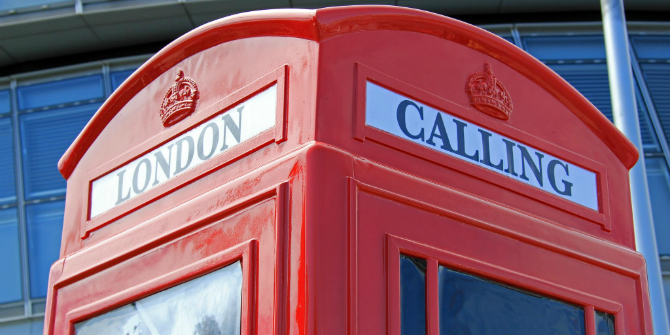‘London Calling Brexit’ is a new series that will appear on the Brexit blog over the next few months. In this introductory post, the series editor, Tim Oliver (Loughborough University London), outlines why what Brexit means for London and what London means for Brexit is a central but overlooked issue for understanding Brexit. As he shows, with London as the UK’s most distinct and important region, the way Brexit and London interact will have important implications for wider UK politics.
It did not pass unnoticed that in the EU referendum of June 2016, the inhabitants of the UK’s capital city voted to Remain (60% of Londoners who voted did so for Remain) while the UK as a whole (52% Leave), and the rest of England especially (55.4% overall, excluding London), voted for Leave. Nevertheless, in the debates and research that have followed, the focus has been on Scotland and Northern Ireland, with Wales and the rest of England (especially the topic of English nationalism) receiving some attention. Compared to other areas of England, London has not been entirely overlooked. But as so often in the study of UK politics, the focus has been on developments in the areas of London known as Whitehall, Westminster, and the City.
London is far more than Her Majesty’s Government, the Westminster Parliament, or the City. As a political space London is distinct. Its 8.7 million inhabitants (a population larger than that of Scotland and Wales combined) are the most diverse of any UK region or nation. Non-white and non-UK citizens make up a larger proportion of London’s population than anywhere else. London’s economy towers over the rest of the UK. From 13 per cent of the UK’s population, London generates about 23 per cent of UK GDP from which HM Treasury derives an equally large chunk of its tax receipts. Its economy is as diverse as its population, reflecting London’s English, British, European and international links. London is more than the big banks of ‘the City’. It is a global media, tourist, transport, IT, research, design and legal hub. The metropolis’s urban geography means its needs and policies – in housing, transport, policing, energy, education, immigration, race relations, the environment, physical and mental health, welfare and so forth – are on a scale and sometimes very different to those of any other region in the UK. London’s internationalism contrasts with the nationalist politics found in Scotland, Wales, Northern Ireland and increasingly in other areas of England. The metropolis might lack the formal devolved powers found in parts of the UK such as Scotland, but the power of London comes instead from its sheer economic and demographic size, and the influence of the wealth of political institutions based there: UK government, the Court of St James, the Supreme Court and large legal community, the Mayor and GLA, 32 boroughs, most of the UK headquarters for UK media, business and civil society, and numerous universities and most of the UK’s think tanks.
 Image by Karen Roe, (CC BY 2.0).
Image by Karen Roe, (CC BY 2.0).
While we should always be careful not to overplay the differences, London has regularly been accused of growing apart from the UK, or as the title of a BBC TV series presented by Evan Davies neatly captured it: Mind the Gap: London v the Rest. While many have focused on the growing differences between Scotland and the rest of the UK, the capital city itself has become something of an undiscovered country hiding in plain sight. Brexit itself might have revealed this some more. In voting Remain, a majority of Londoners who voted registered a different political outlook to large swathes of the rest of the UK, and especially England. The Leave vote elsewhere in the UK could, to some extent, be explained not only as a backlash against a distant elite in Brussels, but against a capital city – whether in the form of the UK elite in Westminster or as a metropolis where large numbers of its citizens seem to win from globalisation – that has seemed increasingly privileged, distant and alien. That said, London retains strong British and English characteristics and traits. London is also a tale of two cities. 40 per cent of Londoners who voted in the referendum did so for Leave. The metropolis has some of the highest levels of inequality in the developed world. Not everyone in London wins from or feels comfortable with the current setup of Britain, Europe or the world. Furthermore, London’s size can exaggerate its differences. Some other UK cities and towns are also very diverse places and also voted Remain.
Nevertheless, if only because of its size, what Brexit means for London and London means for Brexit matters. For example, if Brexit weakens London’s economy – the UK’s economic heart – then the ramifications would be felt across the country. If London’s needs shape Brexit more than any other area of the UK, then it could reinforce frustrations and anger elsewhere in the UK that London always gets its way.
To better explore the topic of Brexit and London, over the next few weeks the ‘London Calling Brexit’ series will publish blog posts on a range of issues, each written by an expert in the field. The posts will explore such questions as—
-
What do Londoners think about Brexit and how does this fit with their views about the rest of the UK and London’s own politics?
-
How do the rest of the UK, and especially the rest of England and areas that voted Leave, view London?
-
What might Brexit mean for the City of London?
-
What could Brexit mean for the rest of London’s economy?
-
What has Brexit meant for London’s place in debates about the UK’s political economy and attempts to reshape it?
-
Is there a ‘London bubble’ and if so does it warp political and especially media views of the rest of the UK?
-
Has Brexit changed the way the rest of the EU view London?
-
What role is London – either proactively or as a consideration – playing in the Brexit negotiations?
-
What does Brexit mean for London’s British and non-EU citizens?
-
What does Brexit mean for citizens from elsewhere in the EU living in London?
-
What does Brexit mean for London’s young people?
-
What could Brexit mean for London’s place in the UK state, its governance and constitutional order?
-
Will Brexit change the role London plays in Britain’s international relations?
-
What do London’s Leave and Remain campaigners think Brexit will mean for London?
Discussing London always draws complaints that London is already discussed too much. As this series will show, the way we discuss London can often be too narrowly focused. A broader discussion that looks at the whole of London helps reveal not only some of the key issues surrounding Brexit but also help understand the fuller implications of Brexit for UK politics.
This article gives the views of the author, not the position of LSE Brexit or the London School of Economics.
Dr Tim Oliver is Senior Lecturer at the Institute for Diplomacy and International Governance at Loughborough University London.








The relation between Brexit and Greater London is obviously an important subject. However I feel it is a bit late in the day to be filling this blog with posts on this subject.
With the whole UK apparently about to leave the EU without a deal, the particular viewpoint of London, Northern Ireland, Scotland, England or whatever becomes irrelevant. It should be all hands on deck to avoid the disaster of a “no deal”.
Theresa May has made many daft statements about Brexit (remember “Brexit means Brexit”?). One of the worst was “no deal is better than a bad deal”. Given that “no deal” means no Withdrawal Agreement and no Transition Agreement a more honest, if less politically expedient, statement would be ” a bad deal with the EU is always better than no deal at all”.
Thanet where I live with my family is the place where Nigel Farage did not win the seat of Souh Thanet in spite of UKIP high hopesThis says a lot for the people here who voted in large numbers for Sir Roger Gale , the excellant long standing Conservative MP. He has fought against London policy for Thanet which has long been used as a dumping ground for London’s unwanted people.. He has great belief in the value of local airports for local economies.he has fought for our local airport of Manston which has one of the longest runways in the UK.. Manston has not been backed by successive Governments both left and right because they are so London centric. Thanet as I have said is a place London likes to dump people. The airport land was to become a cityThis idea is being pushed for by a Mrs Gloag, of Stagecoach who had decided that there was less money in government subsidised transport.and more money in property speculation. London Councils are desperate to sell their council estates to developers and get rid of it’s unwanted people to places like Thanet.where there is little work and, in Thanet no water.. We are only 75 miles away from London and 1hr 20 by train.yet we are treated as if we do not have a right to a voice.Our MP Sir Roger is a Remainer, but understands why people here voted to leave. London you say is a world city , but that does not give it a right to cause to get away with 2008 crash the rest of the country has to pay for.and it does not give it a right to socially cleanse London. London is a victim of it’s own greed. Phallic towers of glass and steel are going up a pace. I think London will kill itself when the middle classes can no longer afford to live there.Parts of London are already a souless Disney Park to wealth.
I stopped reading at “London’s internationalism contrasts with the nationalist politics found in Scotland”, – a typical Londoncentric comment
Scotland voted 65% to stay in the EU. The SNP Scottish Government argues for being in EU and as second best alternative staying in Single market and Customs Union.
I hope author is better informed when lecturing